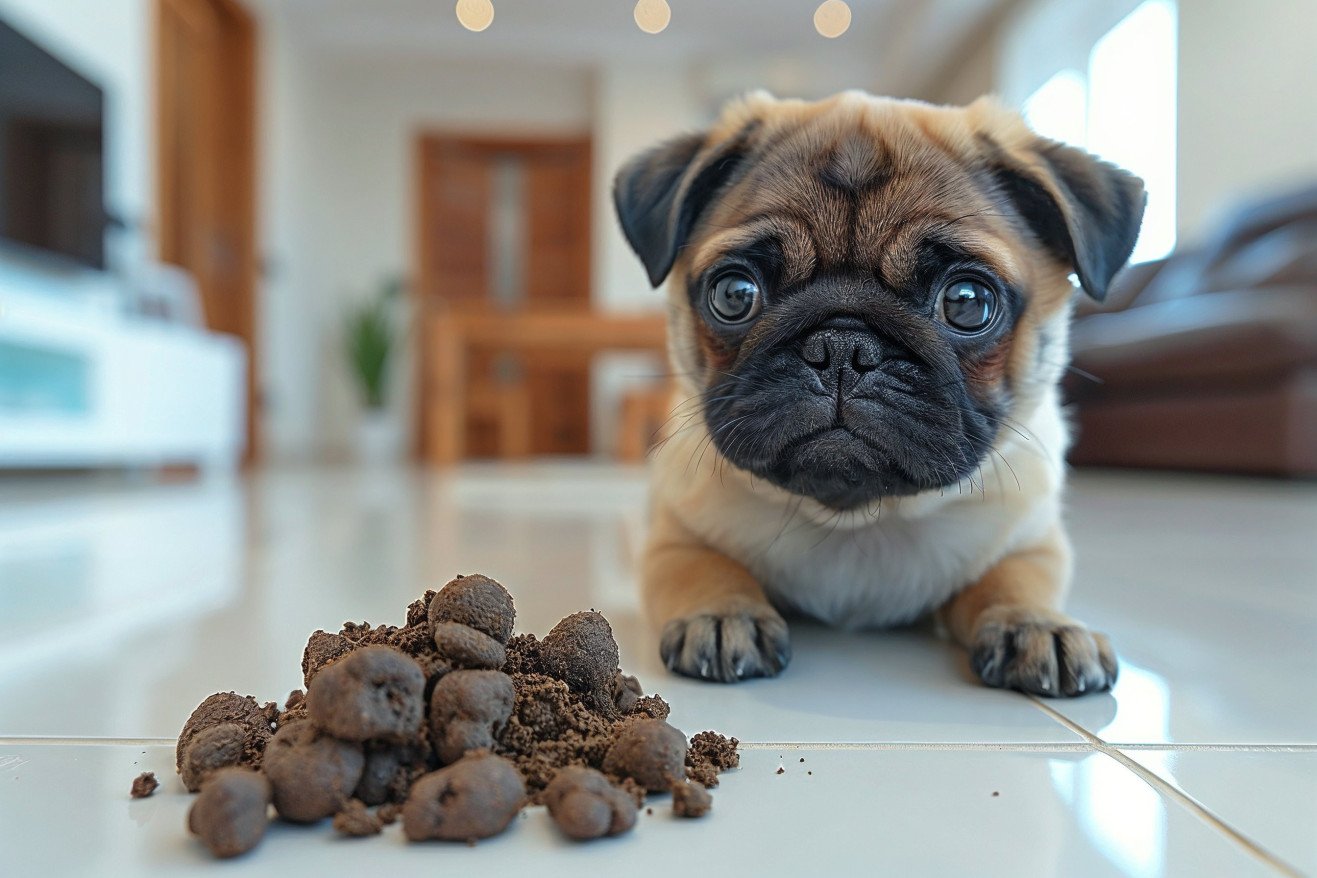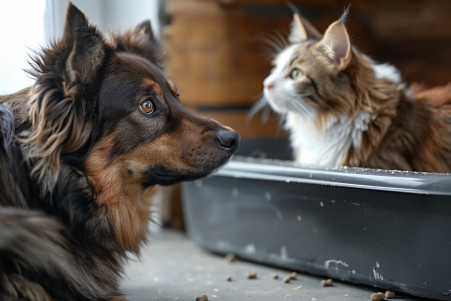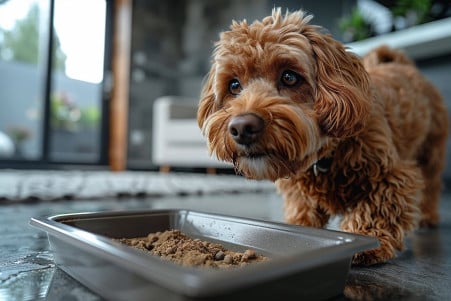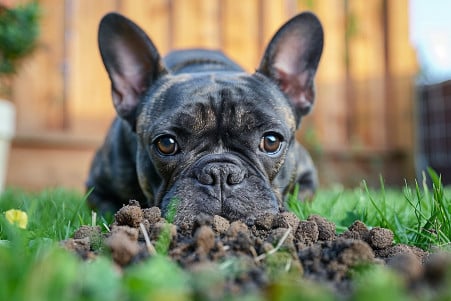How to Prevent Your Puppy from Eating Poop: Effective Home Remedies
9 April 2024 • Updated 9 April 2024

If you're dealing with a puppy that eats poop, you're not alone. This common problem can be frustrating, but with a little knowledge and some home remedies, you can help your puppy kick the habit. By using a variety of methods, including environmental management, positive reinforcement training, and the use of taste deterrents such as pineapple or meat tenderizer, as well as making sure your puppy's nutritional needs are being met and that they don't have any medical issues, you can help your puppy stop eating poop.
We will cover practical, science-based solutions that are designed to address the root causes of this behavior. By learning about the reasons behind your puppy's behavior, you can use positive reinforcement to discourage it and improve your relationship with your dog.
What are the best home remedies to stop a puppy from eating poop?
How to Train Your Puppy to Stop Eating Poop
Positive reinforcement is the most effective way to train your puppy to stop eating poop. According to The Spruce Pets, you can use treats, petting, or playtime to reward your puppy for not eating poop, which will help them learn the behavior you want them to exhibit. Meanwhile, you can use the "leave it" command, which is recommended by Wag!, to teach your puppy not to go near poop when you're out for a walk.
It's also important to make sure your puppy is getting enough exercise and mental stimulation. According to Barking Buddha Pet, increasing the amount of playtime, exercise, and training your puppy gets can help reduce boredom, which can lead to poop-eating. Meanwhile, you can use puzzle toys or food-dispensing toys to give your puppy something else to focus on.
You'll also need to make sure you're constantly supervising your puppy. As Positively.com points out, picking up poop as soon as possible will prevent your puppy from being able to eat it. You can also keep your puppy on a leash when you take them outside so that you have more control over where they can and can't go.
Although taste deterrents like hot sauce can be effective at making poop less appealing, The Spruce Pets warns against using negative reinforcement, which can include yelling at your puppy or rubbing their nose in poop. Not only can these tactics be damaging to your relationship with your puppy, but they can also be less effective than positive reinforcement. Instead, focus on staying calm and rewarding your puppy when they do the right thing. With time and a consistent, positive training plan, most puppies can be trained to stop eating poop.
Dietary Supplements and Nutritional Solutions
Dietary supplements and nutritional solutions can help prevent coprophagia in dogs. For example, adding pineapple or pumpkin to a dog's diet can help prevent coprophagia because they taste bad and are high in fiber, according to Four Paws.
Supplements that include probiotics, digestive enzymes, and vitamins can also help with any nutritional deficiencies that may be causing the problem, says Healthy Solutions For Pets. In addition, feeding dogs a high-quality, more digestible food can help them absorb more nutrients and be less likely to eat poop, according to Pet Parents®.
Some supplements that include bitter-tasting ingredients or flavors, such as yucca and parsley, can help make poop less appealing to dogs, according to the Nutri-Vet Nasty Habit Chewable Tablets product description. However, it's important to talk to a vet before giving your dog any supplements or making any major changes to their diet to make sure they are safe and effective.
Environmental Management and Hygiene Practices
Keeping a clean, well-managed environment is key to preventing coprophagia in puppies. As Preventive Vet explains, cleaning up all feces immediately removes access and the temptation. In addition, maintaining a regular potty routine and watching the puppy closely while they are outside can help limit the chances of the behavior.
Applying deterrents like bitter sprays or other bad-tasting substances to feces, as recommended by Equipaws Pet Services, can make the feces less appealing to the puppy. Providing a clean, stress-free environment and mental stimulation through play and training can also help prevent coprophagia due to boredom or anxiety, according to the American Kennel Club.
Blocking off litter boxes or other areas where feces may be present can also help prevent the puppy from getting to them, according to We Feed Draw. By following these environmental management and hygiene practices, you can discourage coprophagia and help support your puppy's health and well-being. If the behavior continues, however, you may need to look into any medical causes.
Dealing With Underlying Medical Concerns
If your puppy continues to eat poop even after you've tried training and other management techniques, there may be some underlying medical concerns. According to Vetster, things like gastrointestinal issues, pancreatic insufficiency, and diabetes can cause an increase in appetite and lead to coprophagia.
As mentioned by Clinicians Brief, your vet may suggest diagnostic tests, including fecal exams and blood work, to rule out any medical concerns. If any medical issues are found, treating them can help stop the behavior.
The VCA Animal Hospitals stress that it's important to make sure that your puppy is going to regular vet check-ups and being monitored for any changes. By dealing with any medical concerns, pet parents can make sure that they're getting to the root of the problem and helping their puppy get past this bad habit.
Be Patient, Be Persistent, and Be Thorough
In most cases, you will need to use a multi-faceted approach that includes training, dietary changes, and environmental modifications. It's important to be patient and persistent because it may take a while for your puppy to break the habit. You should also consider talking to a vet or a certified dog trainer for individualized help and support.
Make sure that you are also dealing with any medical or behavioral problems that may be contributing to the issue to ensure that you are able to help your puppy in the long run. However, most puppies can be helped to stop eating poop and go on to live healthy lives with the right approach.


